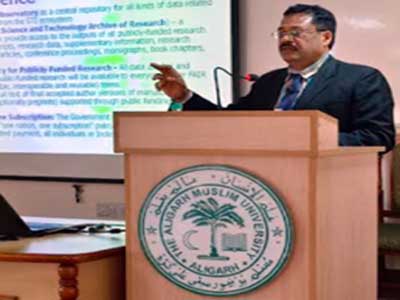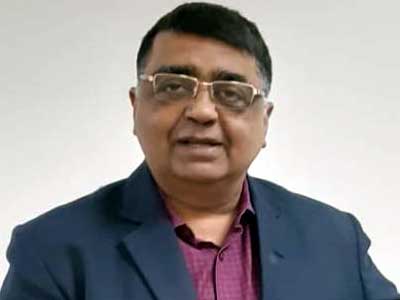Aligarh: Dr SK Varshney, Advisor, International Division, Department of Science and Technology, Government of India, spoke on fostering, developing, and nurturing a robust system for evidence and stakeholder-driven Science, Technology and Information planning, evaluation, and policy research in India.
He was delivering a public talk on ‘Draft Science, Technology and Innovation Policy of India’ at the Department of Physics, Aligarh Muslim University.
Dr Varshney said that the Draft Science, Technology and Innovation Policy will bring about profound changes through short, medium and long-term mission mode projects by building a nurtured ecosystem that promotes research and innovation on the part of both individuals and organisations.
“In the policy proposal, a National STI Observatory as a central repository for all kinds of data related to and generated from the STI ecosystem is suggested to be established”, he said adding that it will help identify and address strengths and weaknesses of the Indian STI ecosystem to catalyse socio-economic development of the country and also make the Indian STI ecosystem globally competitive.
Dr Varshney pointed out that the Indian Science and Technology Archive of Research will be a dedicated portal to provide access to the outputs of all publicly-funded research—including manuscripts, research data, supplementary information, research protocols, review articles, conference proceedings, monographs and book chapters.
He emphasised that the policy will enable the data used in and generated from public-funded research to be available to everyone under findable, accessible, interoperable and reusable terms. The full texts of final accepted author versions of manuscripts supported through public funding will be deposited.
Dr Varshney said that initiative ‘One Nation, One Subscription’ in the policy will bring a drastic change in the research outcome providing easy access to journal articles.
“This new policy revolves around the core principles of being decentralised, evidence-informed, experts-driven, and inclusiveness. It aims to bring in the concept of ‘dynamic policy’ with a robust policy governance mechanism incorporating features such as implementation strategy, periodic review, policy evaluation, feedback, and adaptation”, he added.
Prof BP Singh, Chairman, Department of Physics extended the vote of thanks.
Dr Varshney also visited the DST funded laboratories at the Department of Physics and interacted with Prof Shakeel Ahmad regarding DST funded computing facilities.












Related Items
How India’s smog has turned breathing into a class divide…
Webinar on Gender-Inclusive Leadership for Developed India
Celebrating the Spirit of Science on National Science Day